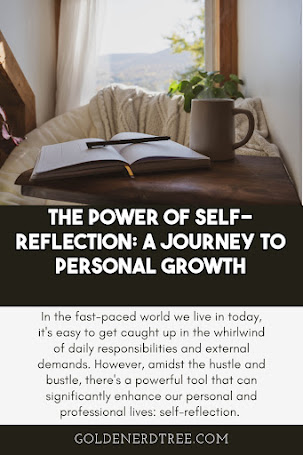- Get link
- X
- Other Apps
- Get link
- X
- Other Apps
In the fast-paced world we live in today, it's easy to get caught up in the whirlwind of daily responsibilities and external demands. However, amidst the hustle and bustle, there's a powerful tool that can significantly enhance our personal and professional lives: self-reflection. This practice is not just about looking back at our actions and experiences; it’s about understanding them, learning from them, and using those insights to fuel our growth. In this post, we'll explore the importance of self-reflection and provide practical tips on how to incorporate it into your daily routine.
What is Self-Reflection?
Self-reflection is the process of introspection—examining your thoughts, feelings, actions, and motivations. It involves taking a step back and considering why you do what you do, what you believe, and how you interact with the world around you. This practice helps in gaining a deeper understanding of yourself, which is crucial for personal development.
The Benefits of Self-Reflection
Enhanced Self-Awareness: By regularly reflecting on your actions and thoughts, you become more aware of your strengths, weaknesses, and areas for improvement. This self-awareness is the foundation of personal growth.
Improved Decision-Making: Reflecting on past decisions and their outcomes helps you make better choices in the future. You learn from your mistakes and successes, leading to more informed and thoughtful decisions.
Better Emotional Regulation: Self-reflection allows you to understand your emotions and triggers better. This understanding helps you manage your reactions and responses in a healthier way.
Increased Accountability: When you regularly assess your actions and behaviors, you hold yourself accountable for your choices. This accountability fosters a sense of responsibility and integrity.
Enhanced Problem-Solving Skills: Reflecting on challenges and how you addressed them enhances your problem-solving skills. You can identify what worked, what didn’t, and apply these lessons to future situations.
How to Practice Self-Reflection
Set Aside Time: Dedicate a specific time each day for self-reflection. This could be in the morning, evening, or during a quiet moment in your day. Consistency is key.
Journaling: Writing down your thoughts and experiences is a powerful way to reflect. Journals provide a tangible record of your reflections, allowing you to track your growth over time.
Ask Yourself Questions: Use prompts to guide your reflection. Questions like "What did I learn today?" or "How did I handle that situation?" can provide valuable insights.
Meditation: Mindfulness meditation encourages self-awareness and introspection. It helps you stay present and observe your thoughts without judgment.
Seek Feedback: Sometimes, others can see things about us that we might miss. Seek feedback from trusted friends, family, or colleagues to gain a different perspective on your actions and behaviors.
Use Self-Reflection Apps: There are numerous apps designed to facilitate self-reflection. These tools can provide prompts, track your reflections, and help you stay committed to the practice.
Conclusion
Incorporating self-reflection into your daily routine can lead to profound personal growth and development. It enhances self-awareness, improves decision-making, and fosters emotional regulation. By setting aside time for introspection, journaling, asking guiding questions, meditating, seeking feedback, and utilizing technology, you can make self-reflection a powerful habit. Embrace the journey of self-discovery and watch as it transforms your life for the better.
- Get link
- X
- Other Apps

Comments
Post a Comment